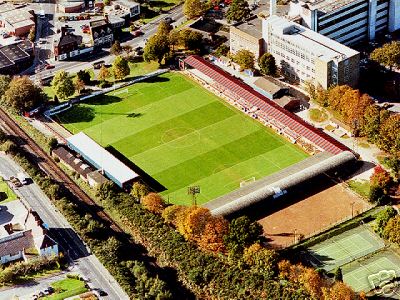|
Aldershot Town Football Club
At its meeting on 20th March, 2001, the Cabinet had given preliminary consideration to a request from Aldershot Town Football Club for the granting of a 25 years' lease on the Recreation Ground. The Cabinet had sought the views of the Panel on the Club's plans for the future and that the Panel's recommendations would then be reported to the meeting of the Cabinet on 3rd April, 2001.
The Chairman welcomed to the meeting Mr. Karl Prentice (Chairman) and Mr. Graham Brookland (Club Secretary) of Aldershot Town Football Club who gave a presentation on the Club's plans for the future. The presentation gave details of the Club's progress in the nine seasons following the formation of the Club in 1992, including details of the Club's accounts and players' and manager's salary bill over the nine year period. It was believed that there was a need for the Club to be able to generate more income and that one way of achieving this would be the redevelopment of the social facilities at the Recreation Ground. Plans for the development of the social club .had been drawn up and tenders had been received indicating an average cost of £300,000 for the proposed redevelopment. A business plan had been developed setting out how the proposed redevelopment of the social club would be funded and forecast details were given of the social club's anticipated annual turnover.
Mr. Brookland spoke of the Club's involvement and commitment to the local community over the previous nine years which included much investment of time and money on junior and youth development. It was noted that the Club also ran teams for children from the ages of six to eighteen, a youth team, ladies' team, reserves and first team. The Club was in the process of taking 24 local 16-l 9 year old talented boys on an educational coaching training scheme, as well as employing a full-time youth development officer who would be working with the community and local partners, schools, sports co-ordinators, local authorities and the Football Association. Work in these areas would be incorporated into the Club's development plans.
Following research by the Club, it had been established that, with a 25 years lease, the Club could potentially be successful in receiving grant aid from the Football Foundation up to an amount of £l million, with a possible further £100,000 over a five year period. This would enable the Club to achieve further redevelopment of the Recreation Ground in three phases:
Phase I
- Social Club
Phase II
- Toilets, turnstiles and stadium
Phase III
- On-site training and coaching facilities, including an all weather pitch
Messrs. Prentice and Brookland then answered Members' questions on working with the local community, the level of funding required for the Club's proposed redevelopment and the financial stability of the Club. Messrs. Prentice and Brookland were thanked for their presentation and then left the meeting.
During a general discussion, the Director of Resources confirmed that he received monthly details of the Club's accounts and had inspected the Club's audited accounts with which he was satisfied. Members expressed their support for the Club's proposals. However, it was suggested that confirmation should be sought of the financial resources available before agreement could be given to a lease. It was recognised that securing a lease would enable the Club to achieve the proposals for redevelopment which would secure benefits for the local community. It was also suggested that any lease should be worded to the effect that any further redevelopment at the Club would be subject to the landlord's consent.
The Panel RESOLVED to recommend to the Cabinet that:
the priority for the Club should be the development of the social club to provide an additional source of income and that the Council should support this subject to confutation of the financial resources available for the redevelopment;
the Council should agree a 25 years' lease for the Club, subject to appropriate safeguards for the Council's asset,. particularly in relation to landlord's consent, which should be linked to the benefit of development to the local community; and
the Council should support the Club's plans for further development of the Recreation Ground, particularly in relation to the provision of toilet facilities, spectator accommodation, turnstiles and additional recreation facilities, including an all weather pitch, and work with the Club on these improvements.
